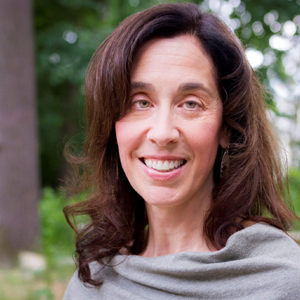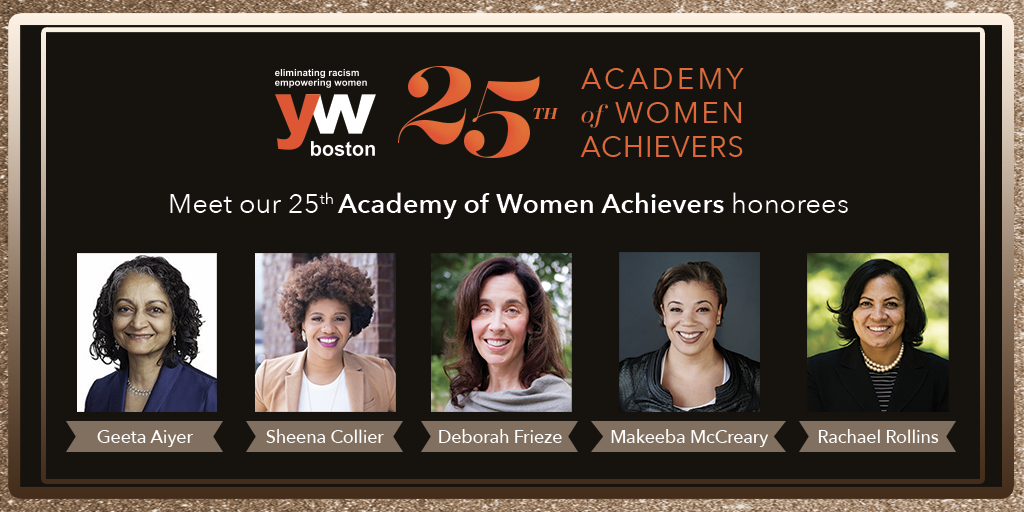Meet Deborah Frieze, 2020 Academy of Women Achievers Awardee

On October 29, 2020 we will join together and celebrate the achievements of five unstoppable women who demonstrate YW Boston’s mission of eliminating racism and empowering women at our 25th Anniversary Academy of Women Achievers Luncheon. Please note that due to COVID-19 concerns, this event has been postponed from June 2 to October 29.
Since 1995, as part of our mission to promote and celebrate the achievements of women, YW Boston has held the Academy of Women Achievers luncheon. Through this event, we recognize and honor some of Boston’s brightest, boldest, bravest, and most influential women. Leading up to the event, we are sitting down with each of the 2020 awardees for interviews and releasing one each month.
YW Boston cannot wait to induct Deborah Frieze into the Academy of Women Achievers. She is the Founder & Managing Director of Boston Impact Initiative, an impact investing fund working to close the racial wealth divide in Eastern Massachusetts. Deborah is also founder of the Old Oak Dojo, an urban learning center. To learn about Deborah, read our interview with her:
_
We are thrilled to honor you at our 25th Academy of Women Achievers on June 2nd. Can you please tell us what about YW Boston’s work resonates with you?
Everything I’ve ever done has happened because I’ve had a community around me—a community of mentors, allies, cheerleaders, truth-speakers and stand-by-you-no-matter-what women. This community has called me to step fully into my leadership, demanded that my contribution get bigger, surrounded me with love and care when I’ve faltered, listened patiently when I’ve been confused. My mentor Meg Wheatley taught me, Whatever the problem, community is the answer. YW Boston encircles leaders of all generations with community, giving them the social capital they need to accomplish their goals.
You made quite the career change – in 2001, you left your career as a high-tech executive to focus on social activism. Can you speak about the moment you realized you wanted to dedicate your work to equity and justice?
I was raised in a family of activists. My great-grandmother was a radical left-wing activist and alleged member of the Communist Party; my aunt was a Freedom Rider in Mississippi. I was raised to believe that our society was unjust, and that those of us who had opportunity had a responsibility to contribute. But like many young people, I got caught up in my career as an entrepreneur. While being part of the dot-com boom, I became disillusioned by a business culture that emphasized short-term results, looked upon growth as an end rather than a means, and cared more about compliance than community. So I walked out.
I was lucky to meet Meg Wheatley and a community of pioneering leaders from around the world who were walking out of organizations and systems that were failing to contribute to the common good and walking on to build healthy and resilient communities. I spent a decade side-by-side with these leaders in Brazil, India, Mexico, South Africa and Zimbabwe experimenting together with distributed leadership, regenerative ecological practices, participatory governance and cooperative economics. These communities are the subject of my book, co-authored with Meg Wheatley, Walk Out Walk On: A Learning Journey into Communities Daring to Live the Future Now.
The Boston Impact Initiative, which you founded in 2013, focuses on economic justice to invest in opportunity for all people. Can you please speak more about your investment philosophy?
We are working to build a sustainable, inclusive and equitable economy that restores the productive capacity of communities of color in Eastern Massachusetts. We do this by investing integrated capital (equity, debt and grants) in regenerative local enterprises that are owned and controlled by entrepreneurs of color or are employing and serving communities of color. In addition to making investments in small businesses and nonprofits, BII Fund works with our portfolio companies to strengthen the impact they have in their communities, improve the effectiveness of entrepreneurial services in Eastern Massachusetts and educate fellow investors and philanthropists about investing to close the racial wealth divide.
We do this as a nonprofit charitable loan fund, which means that we don’t seek to maximize financial returns for our investors. Instead, we seek to maximize returns for the owners and workers at the enterprises we support. That can be counterintuitive for investors! But it makes all the sense in the world for those of us whose concern is reducing wealth inequality.
How is the Boston Impact Initiative engaging people in the financial industry to continue your work of building equitable local economies?
In many ways, we’re seeking to disrupt the financial industry’s assumptions about the purpose of investing. We do not share the conventional belief that the role of investment capital is to make as much money as possible for investors. Instead, investing should be assessed through the lens of Integrated Returns, which means measuring financial, social and ecological impact in aggregate. That requires asking questions like, “How much wealth will this investment create for workers?” “What kind of climate impact will this investment have?” “What kind of social risk is there in not capitalizing this enterprise?”
Until recently, investors rarely took into account the structural inequities in access to capital for entrepreneurs of color. Through our fund, we’ve been able to demonstrate the effectiveness of bringing a rigorous intersectional lens to investing by developing a portfolio of equitable, just and regenerative local enterprises. And we’ve been delighted by the response! We actually had to pause our fundraising because we had more interest from financial professionals in purchasing our notes on behalf of their clients than we had capacity for. Over the past four years, we’ve seen a rapid shift in a portion of the financial industry as it learns to bring a racial justice lens to investing.
'Through our fund, we’ve been able to demonstrate the effectiveness of bringing a rigorous intersectional lens to investing by developing a portfolio of equitable, just and regenerative local enterprises.' -Deborah Frieze, 2020 AWA awardee Click To TweetIn 2013, you also founded the Old Oak Dojo, which serves as a “community home…an experiment in dissolving the boundary between public and private.” How have you seen this play out in practice?
The Old Oak Dojo is in my backyard. It’s a 900-square-foot building on a half-acre property in Jamaica Plain that operates entirely in gift culture, which means no one is allowed to charge fees for the space. Instead, we rely on one another to self-organize to maintain the beauty of the space and to support one another in our shared commitment to create a more racially, socially and economically just world. The door is unlocked, and groups come and go, daytime and evening. As they wish, people participate in maintaining the garden, helping to shovel or rake, and contributing mugs or cushions to the space to make it more comfortable for those who come next.
What advice do you have to women who have a great idea, such as those you have had with the Boston Impact Initiative and the Old Oak Dojo, and are unsure how to turn it into impact?
Create your council! There’s no way to build a dream alone. Even if you don’t have a colleague to dive in with, find friends and mentors who will dream with you and tell you honestly when it’s time to change direction.
_
Learn more from Deborah Frieze at our 25th Annual Academy of Women Achievers Luncheon on Thursday, October 29, 2020.

